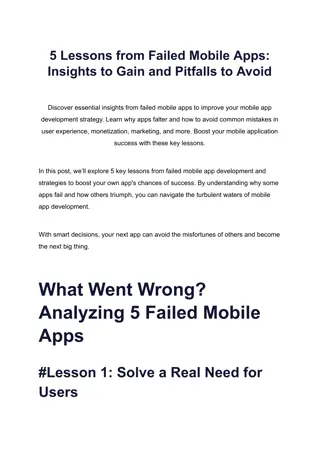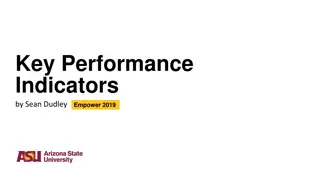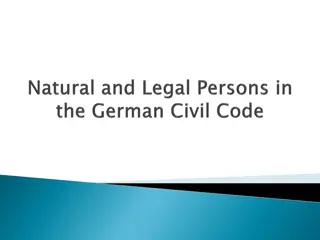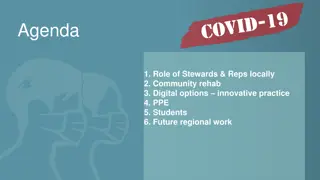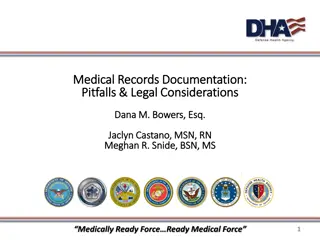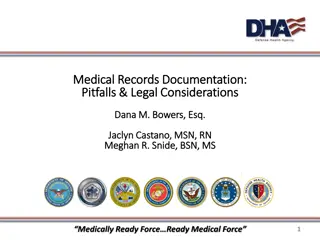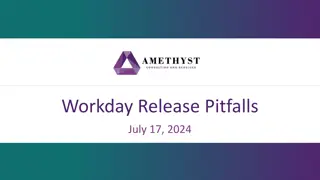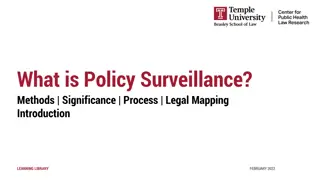Challenges in Managing Reluctant Returners: Pitfalls and Legal Obligations
Dealing with staff who are hesitant about returning to work poses various risks such as breaching trust, potential discrimination, and health and safety concerns. The article also discusses the protection for whistleblowers regarding COVID-19 health and safety risks, as well as recent case law on employer liability for employee data breaches.
Download Presentation

Please find below an Image/Link to download the presentation.
The content on the website is provided AS IS for your information and personal use only. It may not be sold, licensed, or shared on other websites without obtaining consent from the author. Download presentation by click this link. If you encounter any issues during the download, it is possible that the publisher has removed the file from their server.
E N D
Presentation Transcript
Dealing with reluctant returners What are the pitfalls? www.dlapiper.com 1
Dealing with reluctant returners What are the pitfalls? Different categories of staff to manage: Clinically extremely vulnerable employees (previously shielding); Clinically vulnerable employees (non-shielding); Non-vulnerable employees who are anxious about returning. Risks: Breach of mutual trust and confidence; Disability discrimination/reasonable adjustments; Duty to protect health and safety; Section 100 ERA: automatic unfair dismissal for health and safety reasons. Pay entitlements. www.dlapiper.com 2
Whistleblowing on COVID-19 health & safety risks Will whistleblowers be protected? www.dlapiper.com 3
Whistleblowing on COVID-19 health & safety risks Will whistleblowers be protected? The employer has an obligation to provide a safe working environment: refusal to work or complaints about the working environment could be a protected disclosure. Protection available where: Information is disclosed; To employer/other specified people; In public interest; Information shows e.g. a failure to comply with a legal obligation or danger to health and safety. Whistleblower will be entitled to protection from dismissal and other forms of detrimental treatment. Practical steps for employer: Treat concerns as disclosures; Keep records; Respond promptly and fully. www.dlapiper.com 4
Recent case law Lessons to be learnt www.dlapiper.com 5
Case law Employer not vicariously liable for employees data breach In Morrisons Supermarkets plc v Various Claimants [2020] UKSC 12,the Supreme Court found that the Employer was not vicariously liable for the employee s data breach. A senior internal IT auditor employed by Morrisons, downloaded the payroll data of 100,000 employees onto a personal USB and uploaded the data onto a file-sharing website and sent anonymous links to three UK newspapers, motivated by a grudge against his employer following minor disciplinary proceedings. 9,263 employees, whose personal data had been disclosed, issued a claim against Morrisons for damages for breach of the Data Protection Act 1998 ( DPA ) and/or for the misuse of private information and/or for breach of confidence by Mr Skelton. The High Court and the Court of Appeal found that Morrisons was vicariously liable for Mr Skelton s conduct, whether for breach of statutory duty under the DPA, tortious misuse of private information, or breach of confidence in equity. The Supreme Court upheld Morrisons appeal, finding that the lower courts had misunderstood the principles governing vicarious liability in a number of relevant respects. www.dlapiper.com 6
Case Law Tribunal finds workers, not just employees, are covered by TUPE In Dewhurst and ors v (1) Revisecatch Limited t/a Ecourier (2) City Sprint (UK) Limited [2020] UKSC 12 the Employment Tribunal found that ARD should be construed as encompassing not just those with a traditional contract of employment, but also those in the intermediate class who are recognised as limb (b) workers, and whose rights substantially derive from EU law. The Claimants worked for City Sprint as cycle couriers providing courier services for a client called HCA Healthcare. In 2016, one of the Claimants brought an Employment Tribunal claim against City Sprint and was found to be a worker. Two years later, City Sprint lost the HCA Healthcare contract to a rival, Ecourier. The Claimants stopped working for City Sprint on 31 January 2018 and began working for Ecourier the next day. The Claimants brought claims against both City Sprint and Ecourier, including a claim for failure to inform and consult under TUPE. Regulation 2 of TUPE provides that the regulations apply to employees . In order for their claims to proceed, the Employment Tribunal had to consider whether or not the scope of the term employee within regulation 2 of TUPE could include both employees and workers within UK law. www.dlapiper.com 7
Case Law Reasonable adjustment for employer to give undertaking on severance pay In Hill v Lloyds Bank plc [2020] UKEAT/0173/19/LA the EAT upheld an Employment Tribunal s decision that failure to make reasonable adjustments, (give an undertaking for a severance pay-out), was disability discrimination. Mrs Hill, an employee of the bank complained of bullying and harassment by two colleagues. She was off sick for over a year with reactive depression as a result, which classed her as disabled for the purpose of the Equality Act 2010. On the Claimant s return to work following a period of sick leave she sought reassurance from her employer on the condition that they would not require her to work with the two colleagues concerned. However, the Claimant wanted reassurance that she would be offered a severance package if these working arrangements were no longer available. In response to this, the Respondent refused to agree to the proposed condition or any condition of the proposed effect. www.dlapiper.com 8
Case Law Beneficial contractual changes void if agreed by reason of TUPE transfer In Ferguson and ors v Astrea Asset Management Ltd [2020] UKEAT/1039/19/JOJ, the EAT has held that Reg 4(4) TUPE, (that renders void any variation to a TUPE- transferred contract of employment if the sole or principal reason for the variation is the transfer), applies to all variations, not just those that are adverse to the transferring employee. The Claimants (4 of them) were directors of a business, who transferred to a new business Astrea Asset Management , the Respondent. Shortly before the transfer, they awarded themselves bonuses and generous termination payments. The Respondent dismissed the First and Second Claimants for gross misconduct by way of dishonesty. The Claimants brought proceedings in the ET for unfair dismissal, contractual termination payments on the basis of the new contracts, and "compensation payments" for breach of regulation 13(4) of TUPE. www.dlapiper.com 9
Case Law Yodel driver appears not to have worker status for purposes of Working Time Directive In B v Yodel Delivery Network Ltd (C-692/19), the ECJ has given a preliminary ruling regarding determining worker status. The ECJ ruled that the definition of worker status applied by the UK courts is not incompatible with EU law (specifically the Working Time Directive). The WTD must be interpreted as precluding a person engaged by his putative employer under a services agreement that stipulates that he is a self-employed independent contractor from being classified as a worker where that person is afforded discretion in a number of ways listed by the Court, provided that the independence of that person does not appear to be fictitious and it is not possible to establish the existence of a relationship of subordination between that person and his putative employer. B is a neighbourhood parcel delivery courier who has worked exclusively for Yodel since July 2017. Yodel neighbourhood couriers are engaged on the basis of a courier services agreement that stipulates that they are self-employed independent contractors . They use their own vehicle to deliver the parcels handled by Yodel and use their own mobile telephone to communicate with that undertaking. Under the courier services agreement, couriers are not required to perform the delivery personally, but may appoint a subcontractor or a substitute for the whole or part of the service provided. www.dlapiper.com 10
Case Law Sufficient Connection to British Employment Law In Hamam v Foreign and Commonwealth Office [2020] UKEAT/0123/19/JOJ, the EAT upheld an Employment Tribunal decision that a locally recruited Vice Consul at the British Embassy in Cairo, Egypt, could not bring Employment Tribunal; Claims for unfair dismissal, discrimination, victimisation or detriment in Great Britain. The Claimant was employed as a Vice Consul at the British Embassy in Cairo. Upon termination of her employment she brought claims in the Employment Tribunal ("ET") for race discrimination, victimisation, unfair dismissal and whistleblowing detriment. The ET judge held that the Claimant's employment was insufficiently connected to Great Britain, giving many factors in support of this conclusion, including that she was recruited in Egypt, worked permanently and predominantly in Cairo, was an Egyptian national and paid tax in Egypt. The Claimant appealed to the EAT on numerous grounds, including that the ET had not properly considered the argument that the embassy was a "British enclave". This case highlights the multifactorial approach that must be taken in deciding whether a person working abroad has a "sufficient connection" with Britain and British employment law. www.dlapiper.com 11 UKG/98698600.1
Case Law Equal Pay: the material factor defence In Walker v Co-operative Group Limited [2020] EWCA Civ 1075, the Court of Appeal has held that the Tribunal was wrong to find that an employer s material factor defence to an equal pay claim ceased to operate at some point between its original decision on pay and the completion of a job evaluation study a year later. The Claimant was appointed as a HR Officer by the Respondent in 2014. The Claimant received a salary increase to 425,000 (still lower than the salaries of other executives). The Claimant was later dismissed in 2017 and brought a claim for equal pay in comparison to two of her male colleagues. The Respondent sought to rely on the material factor defence based on four factors: vital roles, executive experience, flight risk and market forces. There was insufficient evidence on which to base a conclusion that all or any of the factors that originally justified a pay discrepancy had ceased to be relevant. www.dlapiper.com 12 UKG/98698600.1
Case Law ET capable of hearing personal injury claim In Akay v Newcastle University [2020] EWHC 1669 (QB), the High Court recently held that a Claimant should have brought a personal injury claim before an ET, when pursuing simultaneous claims for harassment and unfair dismissal. The Claimant had brought a claim in the ET in December 2013 alleging unfair dismissal and harassment but failed to bring a personal injury claim at this time. The Claimant later elected to bring a personal injury claim once the harassment claim had been struck out, but whilst the unfair dismissal claim continued. The Claimant alleged that there was "special reason" not to strike out the personal injury claim. www.dlapiper.com 13 UKG/98698600.1
Case Law Confidential Information: Unfair Dismissal In ACAS v Woods [2020] EWHC 2228 (QB), the High Court granted an order permitting ACAS to disclose, in unfair dismissal proceedings brought against it by a former employee, Mr Woods, an internal investigation report into alleged misconduct containing details of collective conciliations led by Mr Woods. The Tribunal itself did not constitute a court for the purposes of the court order exemption. There was no relevant statutory definition of court and Parliament would have said so expressly if court order encompassed an order by an Employment Tribunal. A disclosure order by the Tribunal would not therefore be sufficient to permit disclosure. The Tribunal would be able to take appropriate steps under Rule 50 of the ET Rules to ensure that the material presented at hearing was strictly confined to that relevant to the issues and that confidentiality was safeguarded. It was therefore appropriate to grant the order. www.dlapiper.com 14 UKG/98698600.1
Case Law Dismissal with no procedure In Gallacher v Abellio Scotrail [2020] UKEATS/0027/19/SS, the EAT found that an employee had been fairly dismissed despite the fact that her employer chose not to follow any form of dismissal procedure. The relationship between the Claimant and her line manager became strained over issues concerning salary and recruitment. The Claimant s line manager decided todismiss her during her annual appraisal with no prior warning or appeal system in place. The line manager cited irretrievable breakdown of working relations as the reason. The ET found that there was a lack of trust and confidence between the employees. The Tribunal stated that the lack of dismissal procedure would usually be unfair but the lack of trust and confidence made this situation different. The EAT dismissed the Claimants appeal although stated that a dismissal without a prior procedure should be treated with caution. If it is clear that a procedure would prove futile (as it seemed in this case) then the employer can disregard it. www.dlapiper.com 15 UKG/98698600.1
Case Law an internal decision to overturn the dismissal as if no dismissal occurred In The Phoenix Academy Trust v Mr S Kilroy [2020] UKEAT/0264/19/AT, the EAT has held that, where an employee appeals an employer's decision to dismiss, an internal decision to overturn the dismissal will, in law, be as if no dismissal ever occurred. The Claimant, a teacher, faced disciplinary proceedings that led to his dismissal by the Respondent. The dismissal decision was overturned, following the Claimant s appeal and he was reinstated, subject to a final written warning. The Claimant stated that it was "unrealistic" to expect him to return to work, and brought proceedings for constructive unfair dismissal. The Claimant s claim was successful at the ET who said that the Claimant had not affirmed his contract of employment by exercising his right to appeal and the Respondent appealed to the EAT. The appeal was allowed. www.dlapiper.com 16 UKG/98698600.1
Case Law Lack of Confidence: Re-engagement InKelly v PGA European Tour [2020] UKEAT/0285/18/DA, the EAT has held that an employer s lack of trust and confidence in an employee s capability may be a relevant factor for a tribunal to take into account when assessing whether it is practicable for the employer to re-employ the employee following an unfair dismissal. The EAT rejected the argument that trust and confidence is only relevant to conduct cases. The EAT also held that the Employment Tribunal in the present case had erred in ordering that the unfairly dismissed employee be re-engaged in a role for which the ability to speak Mandarin was an essential requirement when the employee did not have that skill. www.dlapiper.com 17 UKG/98698600.1
Legislative developments What is coming down the track? www.dlapiper.com 18
Government launches review of workplace support for survivors of domestic abuse (9 June 2020) The business Minister Paul Scully has launched a review of how employers and the government could better support domestic abuse survivors in the workplace. The review, that will include a series of roundtables run by the Department of Business, Energy and Industrial Strategy (BEIS) and the Home Office, alongside individuals and interested organisations, aims to empower employers to support workers affected by domestic abuse. It will also build the evidence base for possible government action. The deadline for consultation submissions was 9 September 2020 and the review will report by the end of 2020. As part of the review, the government is seeking evidence based on the following questions: o what practical circumstances arise in relation to domestic abuse and work? o what support can be offered in the workplace to victims of domestic abuse? o what is possible with the existing framework? o what does current best practice look like? o what is the potential to do more? www.dlapiper.com 19 UKG/98698600.1
Coronavirus Job Retention and Bonus Schemes The CJRS will close on 31 October 2020 and employers will no longer be able to claim grants from HMRC for furloughed workers. The scheme is currently being tapered down. Furloughed workers are currently entitled to 80% of pay, capped at 2,500 per month. In September, employers must contribute 10% of this cost and in October 20%, plus employer NICs and pension contributions. HMRC is expected to scrutinise CJRS claims. Penalties and sanctions will apply to fraudulent claims. A Job Retention Bonus Scheme is being introduced detailed guidance is expected in September. A taxable one-off payment to employers of 1,000 for every employee who they previously claimed for under the CJRS. Employees must remain continuously employed through to 31 January 2021. Salary criteria will apply. Bonuses will be paid from February 2021. A new Kickstart Scheme will directly pay employers to create new jobs for any 16 to 24-year-old at risk of long-term unemployment. Incentives to hire apprentices are being introduced, with a new payment of 2,000 per apprentice, or 1,500 for those aged 25+. www.dlapiper.com 20
New Employment Bill The timeframe of this is not know, but the Bill is expected to implement a number of measures that have been highlighted by the government in 2019-2020, including: Allowing a week s leave for unpaid carers (the consultation ran from 16 March to 3 August 2020, the government response is yet to be published); Extending redundancy protection for new parents (the consultation ran for 10 weeks from 25 January 2019 to 5 April 2019). On 19 July 2019 the government launched the Good Work Plan: Proposals to support families . The consultation was made up of 3 sections: 1. Introducing neonatal leave and pay (this part of the consultation ran from 19 July 2019 to 11 October 2019); 2. Introducing transparency and the right to request a more predictable contract after 26 weeks service (this part of the consultation ran from 19 July to 11 October 2019, the government response it yet to be published); 3. Introducing parental leave and pay balancing gender division in parental leave (this part of the consultation ran from 19 July to 29 November, the government response is yet to be published). www.dlapiper.com 21
Off-payroll working Personal service companies New rules take effect April 2021 The end-user organisation will be responsible for: Determining the workers employment status; and Operating PAYE / NICs on the payments to the PSC. For businesses using PSC workers, the changes will: Impose an increased compliance burden; Result in increased administrative costs; Impose additional risk; and Result in increased tax costs (employer NICs and apprenticeship levy). The rules will impact organisations which use workers employed by Personal Service Companies where, had the worker provided their services directly, they would have been an employee of the organisation. www.dlapiper.com 22
Brexit www.dlapiper.com 23
Latest state of play on right to work Covid-19 right to work checks On 30 March, the government accepted that virtual checks could be temporarily relied upon to satisfy a first-day right to work check. Any virtual checks taken during lock-down must state adjusted check undertaken on [insert date] due to COVID-19 . Upon returning to work, must complete a supplemental check of the original document 8 weeks to comply. When recording the supplementary check, you should state the individual s contract commenced on [insert date]. The prescribed right to work check was undertaken on [insert date] due to COVID-19 . Important for employers to continue to monitor visa expiry dates as illegal working penalties still in place. Brexit and right to work Brexit transition period due to end at 11 pm on 31 December 2020. From 1 January 2021, all ineligible individuals will be subject to the new UK immigration system. EU Settlement Scheme (EUSS) grace period for applicants until 30 June 2021. So far, the government have stated there will be no change to right to work checks until July 2021 but please do stay alert for any changes. www.dlapiper.com 24
Latest state of play on right to work Brexit timeline 30 June 2021 31 December 2020 From 1 July 2021 onwards Until 31 December 2020 Between 1 January 2021 to 30 June 2021 From 1 July 2021 onwards, all new EU nationals must show they have pre-settled or settled status in order to be able to commence work with a new employer. Between now and the end of the year, you will onboard new employees as normal. If you are onboarding an EU national, you do not need to check whether the individual has settled status. A new immigration system will come into place on 1 January 2021. EU nationals who arrive on or before 31 December 2020 must apply for pre-settled or settled status. Individuals who arrive from 1 January 2021 onwards will be treated as third-country nationals and therefore will be subject to the new immigration system. You retrospective checks on EU employees whom you hired before this date. should not need to conduct pre-settled or On the basis of current government guidance, you should continue to onboard EU nationals as normal and should not need to ask whether the individual has pre-settled or settled status. We would strongly advise caution in case this guidance changes. Stay abreast of any changes that could be implemented. New online right to work system In April 2019, the government launched an online right to work portal, enabling employers to check an individual s right to work without having to see the individual s original documentation. This an be used for those who holds a BRP or have received their status under the EU Settlement Scheme. Online right to work checks will become more frequently used as we move towards the digitization of the UK immigration system. www.dlapiper.com 25
Latest state of play on right to work Tips to prepare for Brexit/ right to work Check which employees commenced work during lock-down and ensure you record a supplementary check, in line with the Home Office rules for these individuals. Review your right to work policy and ensure it incorporates the option for individuals to use the new online prove your right to work system by getting use to the system now, you will be prepared to use it more frequently from July 2021 onwards: Employer link: https://www.gov.uk/view-right-to-work Employee link: https://www.gov.uk/prove-right-to-work Keep up to date with any potential changes to the EUSS grace period. Whilst the timeframe for applicants should not change, employers must be aware of any changes to the right to work guidance. Take our right to work quiz and sign up to DLA s immigration alerts to keep up-to-date: Right to work quiz link: https://www.surveymonkey.co.uk/r/6SP2YQW?linkId=98757423 Sign up for alerts link: https://www.dlapiper.com/en/uk/insights/subscribe/newslettersubscription/ www.dlapiper.com 26





